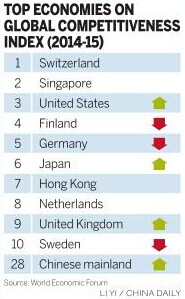

World Economic Forum stresses need to create high-value jobs
The Chinese mainland has edged up one spot to 28th in the World Economic Forum's global competitiveness ranking, reinforcing its position as the most competitive BRICS (Brazil, Russia, India, China and South Africa) economy, according to the institution's latest report.
China continues to lead the BRICS economies by a wide margin - well ahead of Russia (53rd), South Africa (56th), Brazil (57th) and India (71st), according to the Global Competitiveness Report 2014-15, which ranked 144 economies.
The score for each economy was based on its performance on 12 "pillars" of the competitiveness index, which include the macroeconomic environment, infrastructure, labor market efficiency, financial market development, business sophistication and technological readiness.
Small gains in most of the pillars contributed to creating a more conducive ecosystem for entrepreneurship and innovation in China, which explained the nation's better score, the report said.
In the past 12 months, "higher education and training" saw the biggest leap, advancing five points.
The WEF categorized all economies into three groups, from the initial phase of "factor-driven" to "efficiency-driven" and the final phase of "innovation-driven". China was categorized as an "efficiency-driven" economy.
"China is becoming more innovative, ranking 32nd worldwide, but it is not yet an innovation powerhouse," the report said.
However, the report noted that corruption, security concerns, low levels of accountability and lack of transparency continue to weaken China's institutional framework.
The WEF report highlighted China's public debt-to-GDP ratio, at 22.4 percent, as being among the lowest in the world. The gross savings rate also amounts to a staggering 50 percent of GDP.
But the WEF warned that "now is not the time for China to be complacent", noting the country is no longer an inexpensive location for labor-intensive activities and is losing manufacturing jobs to less-developed countries and even to some more advanced economies.
"China must now create the high-value jobs that will sustain the increasing standards of living," the report stated.
Trey McArver, a London-based consultant specializing in China's business sector, said recent central government meetings showed that in the economic domain, Beijing is focusing on "a more market-oriented economy", "more efficient administration" and "an increasingly rules-based system" that will help address China's shortcomings and increase its comprehensive national strength.
Switzerland and Singapore occupy first and second place, respectively, in the ranking, while the United States moved up two spots to third place.
The report noted that the measures that improved the global economic outlook in the past year were mainly based on expansionary monetary policies, which have helped temporarily avoid a deeper recession and set the foundations for the global recovery in the short term.
However, ensuring sustained growth in the long run will depend not on monetary policies but on "boosting the level of productivity of economies", the WEF warned.
Xavier Sala-i-Martin, professor of economics at Columbia University and a leading author of the report, said: "Recently, we have seen an end to the decoupling between emerging economies and developed countries that characterized the years following the global downturn.
"Now we see a new kind of decoupling, between high- and low-growth economies within both emerging and developed worlds. Here, the distinguishing feature for economies that are able to grow rapidly is their ability to attain competitiveness through structural reform," the professor said.
Copyright ©1999-2018
Chinanews.com. All rights reserved.
Reproduction in whole or in part without permission is prohibited.